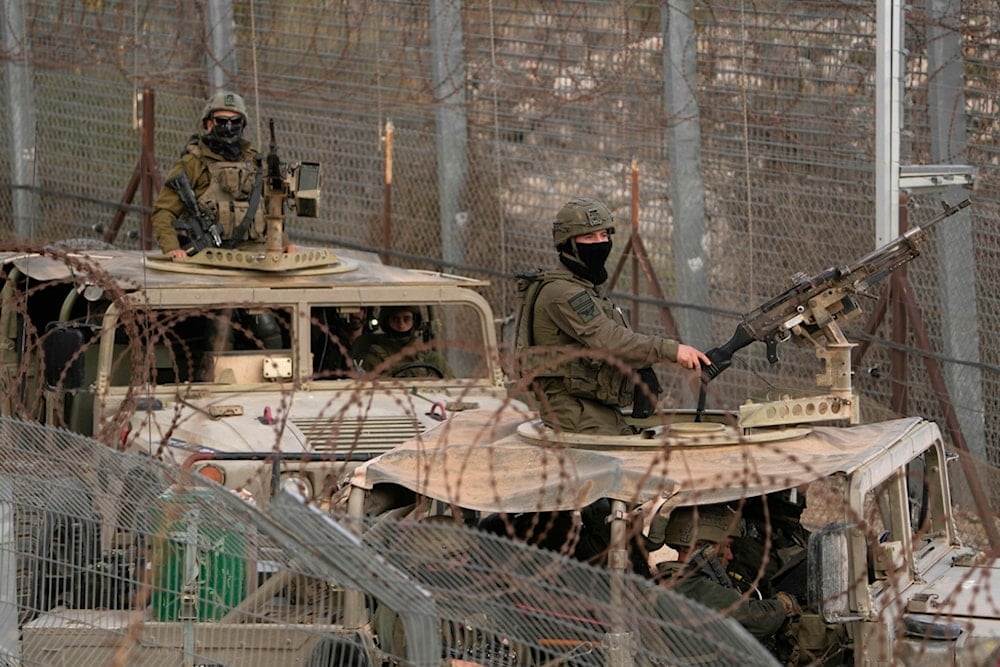Syrians reject Israeli 'aid' in Quneitra countryside amid IOF raids
Syrian residents reject Israeli “aid” after fresh incursions in Quneitra countryside, as occupation forces deploy tanks and reports surface of direct Syria-"Israel" talks.
-

Israeli soldiers stand on armoured vehicles after crossing the security fence near the so-called Alpha Line that separates the Israeli-occupied Golan Heights from Syria, in the town of Majdal Shams, Dec. 21, 2024 (AP Photo/Matias Delacroix, File)
Residents of Abu Madhra’a Farm, located near the town of Saida al-Golan in the Quneitra countryside, have refused to accept what they described as “Israeli aid” following a morning raid by Israeli occupation forces, according to Syrian local sources.
Since the overthrow of longtime ruler Bashar al-Assad in December, "Israel" has carried out hundreds of strikes in Syria.
It has also deployed troops across the demilitarised zone on the Syrian side of the armistice line that used to separate the opposing forces on the occupied Syrian Golan.
Israeli patrol enters Rwihinah village, tanks deployed on outskirts
In a separate field escalation, an Israeli occupation military patrol of approximately 20 soldiers raided the village of Rwihinah in southern Quneitra, where two Israeli tanks were deployed on the village’s outskirts.
The patrol continued its movement into residential areas, sparking fear and tension among the local population.
The repeated Israeli military movements in the region constitute a clear violation of Syrian sovereignty and fall within what observers say is a broader attempt by the occupation to impose new realities on the ground in the occupied Syrian Golan and its surroundings.
Reports of direct Syria-'Israel' talks emerge
In a related development, Israeli broadcaster Kan reported on Thursday that Syrian officials have recently acknowledged, in closed-door conversations, the existence of direct daily dialogue with “Israel”.
A well-informed Syrian source was also quoted as saying that Damascus does not rule out the possibility of reaching a "peace agreement" with the Israeli entity by the end of US President Donald Trump’s term in office.
'Israel' in direct, daily contact with new Syrian gov.: Israeli media
A couple of days ago, Tzachi Hanegbi, head of the Israeli "National Security" Council, also revealed that direct, daily dialogue exists between "Israel" and the new Syrian government, according to Israel Hayom.
During a closed session of the Knesset's Foreign Affairs and Defense Committee, Hanegbi indicated that the talks include both political and security coordination and are personally supervised by him, as part of potential normalization efforts between the two sides.
“There is direct daily dialogue at all levels between Israel and the regime in Syria. I am leading it with political officials there,” he said.
A couple of weeks ago, Israeli Prime Minister Benjamin Netanyahu expressed interest in initiating US-mediated negotiations with the new Syrian government, according to two Israeli officials, as cited by Axios.
Syria, Lebanon candidates for Abraham Accords normalization agreements
According to Hanegbi, Syria and Lebanon are currently the closest regional states to potentially normalize ties with the Israeli occupation, confirming previous media reports of newly established communication channels with Damascus.
Hanegbi referenced past statements by Syrian transitional president Ahmad al-Sharaa during his meeting with French President Emmanuel Macron, where al-Sharaa spoke of indirect dialogue with "Israel".
Al-Sharaa seeks cooperation with 'Israel'
Al-Sharaa previously claimed that Syria and the Israeli occupation "have common enemies" as he called for an end to what he called "tit-for-tat bombings" and stressed the need for regional stability through cooperation.
"The era of endless tit-for-tat bombings must end. No nation prospers when its skies are filled with fear. The reality is, we have common enemies, and we can play a major role in regional security," al-Sharaa said, in reference to "Israel", during an interview for the Jewish Journal.
Furthermore, he expressed his desire to return to the 1974 disengagement agreement between Syria and "Israel", not merely as a ceasefire line but as a platform for "mutual restraint and civilian protection," claiming that this framework could ensure safety, particularly for the Druze communities in southern Syria and the occupied Syrian Golan Heights.
This came amid multiple reports about direct Syrian-Israeli engagement, despite continued Israeli aggression and violations in Syria.

 4 Min Read
4 Min Read










